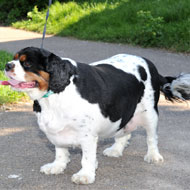
Pet weight loss competition announces this year’s winners
The PDSA Pet Fit Club competition has announced this year’s joint winners – ‘Borris’ the Cavalier King Charles Spaniel and ‘Sadie’ the Labrador.
Both pooches lost 25 per cent of their bodyweight and a combined 18.8kg; proportionate to the size of a beagle.
The competition takes place over six months with personalised, expert diet plans and exercise regimes devised by the charity’s veterinary surgeons and nurses.
Borris weighed 28kg before the competition – 85 per cent over a healthy weight for his breed. Now that he is a trimmer 20.9kg, his owner, Annmarie Formoy, states the best part about his lighter frame is that he now loves his walks and even runs again: “…the first time that I saw Borris taking his first few running steps, it made me want to cry, I was so happy. He hadn’t run in years!"
Formoy admits that “too many treats” caused Borris’ weight gain, as well as his fondness for eating; surreptitiously feasting on everything from Eater eggs to a pair of false teeth.
Sadie weighed-in at 42.2kg prior to her weight loss, and now stands at a healthier 31.5kg. Her owner, George Chaplin, blames her “unrelenting appetite” for her previous size, but is now delighted that, “She’s a totally different dog now and is so much happier.
“We go on two walks a day with a group of dog walkers. At the beginning of her diet she would waddle at the back of the group but now she bounds ahead and that’s great to see.”
Head nurse Louisa Carey from Margate PDSA Pet Clinic and veterinary nurse Kerry Griffith from Basildon PDSA Pet Hospital oversaw Borris’ and Sadie’s successful weight loss plans respectively.
Launched in 2005, the Pet Fit Club has helped 85 dogs, 42 cats, eight rabbits and two rats shed over a combined 475kg.
Image (c) PDSA



 The Veterinary Medicines Directorate (VMD) is inviting applications from veterinary students to attend a one-week extramural studies (EMS) placement in July 2026.
The Veterinary Medicines Directorate (VMD) is inviting applications from veterinary students to attend a one-week extramural studies (EMS) placement in July 2026.